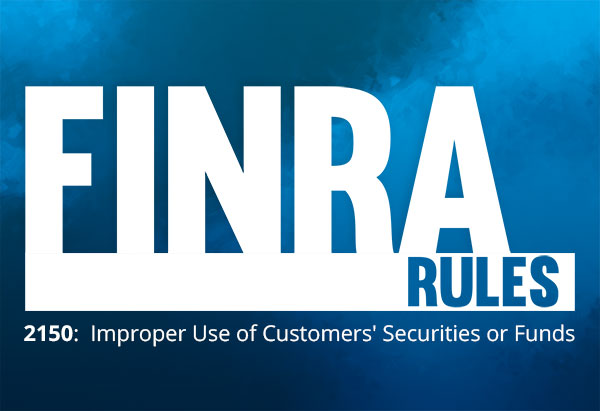What is FINRA Rule 2150?
 The Financial Industry Regulatory Authority (FINRA) is a non-governmental body that is tasked with self-regulating firms and individuals in the securities industry. FINRA is responsible for both protecting individual investors as well as the overall integrity of securities markets. This is done by ensuring that brokers and broker-dealers operate in a manner that is honest, fair and that upholds standards of commercial honor.
The Financial Industry Regulatory Authority (FINRA) is a non-governmental body that is tasked with self-regulating firms and individuals in the securities industry. FINRA is responsible for both protecting individual investors as well as the overall integrity of securities markets. This is done by ensuring that brokers and broker-dealers operate in a manner that is honest, fair and that upholds standards of commercial honor.
There are many different specific regulations that have been promulgated to ensure the securities industry operates smoothly. Here, our securities fraud attorneys discuss FINRA Rule 2150, which governs the use of customer securities and funds.
FINRA Rule 2150
In general, FINRA Rule 2150 regulates how brokerage firms, individual brokers and other associated persons can use customer securities and funds. Specifically, the rule is split into the following three subsections:
- Improper Use
Section A of Rule 2150 prohibits brokers and brokerage firms from ‘making improper use of a customer’s securities or funds’. It is notable that this is very broad language. Indeed, what exactly constitutes the improper use is not explicitly defined within the rule. As such, this regulation gives regulators considerable authority to take action against individuals and firms who have misappropriated the assets of their customers.
FINRA can enforce this rule as is appropriate in a given situation. Most often, Rule 2150 violations involve the improper conversion of customer funds. Conversion is defined as intentionally taking the ownership of another party’s property without their permission. In other words, conversion is stealing. Legal action to seek financial recovery because of a broker’s misappropriation of funds can often be pursued under this rule.
- Prohibition Against Guarantees
Section B of Rule 2150 prevents brokers and broker-dealers from making any ‘guarantees’ to customers. No broker or brokerage firm is allowed to guarantee a customer against potential losses in connection with any securities transaction. At first glance, some traders may wonder why such a rule is: 1) Necessary and 2) In the best interest of traders. After all, as a client, wouldn’t it be a good thing to have your account guaranteed against losses?
The reality is far more complicated. Of course, a guarantee can create the expectation that it is possible for a customer to be protected from the risks that are inherent in investing. But this is simply not possible. True guarantees in securities trades cannot exist.
No firm has the ability to ever sustainably guarantee returns. Any broker that is promising returns is offering a service that they cannot possibly provide. It is a hallmark of Ponzi schemes and other similar types of investment fraud.
To be clear: Rule 2150(b) does not make it illegal for your broker to reimburse you for your losses. In fact, in many cases, brokers will be legally compelled to reimburse you. Members have the power to correct any errors. After the fact, members can always reimburse customer losses on a case-by-case basis.
In doing so, the member firm must comply with FINRA’s settlement reporting requirements to ensure that information has been properly recorded. Settlement agreements cannot be hidden from regulators.
- Sharing in Accounts
Section C of Rule 2150 puts significant restrictions on sharing in customer accounts. Under these regulations, members or associated persons can only share in a customer’s gains or losses in a very limited set of circumstances. More specifically, the following three conditions must be met:
- The broker must receive prior written authorization from their member firm;
- The broker must receive prior written authorization from the customer; and
- The broker can only share in profits or losses in the direct proportion to their own financial contributions to that account.
In other words, a broker can only really ‘share in customer profits or losses’ in the sense that they can make an identical investment with their own money. Though, there is an exemption to this regulation for immediate family members. For example, this proportionality rule does not apply in cases where a broker’s own spouse is their client.
Additionally, there is an exemption to this rule for ‘qualified clients’. Rule 205-3 of the Investment Advisers Act determines whether or not one meets the standards of a qualified client. As of 2016, a client must have a net worth in excess of $2.1 million to meet the threshold for this exemption.
Contact The Sonn Law Group Today
If you believe that your financial advisor or brokerage firm improperly used your funds, our team can help. To set up your free legal consultation with our attorneys, please do not hesitate contact the Sonn Law Group today by calling 1-844-689-5754 or using our online contact form.
We handle all securities fraud claims on a contingency fee basis. We have offices in South Florida and Houston and we represent investors nationwide and internationally.
CONTACT US FOR A FREE CONSULTATION
Se Habla Español
Contact our office today to discuss your case. You can reach us by phone at 844-689-5754 or via e-mail. To send us an e-mail, simply complete and submit the online form below.

